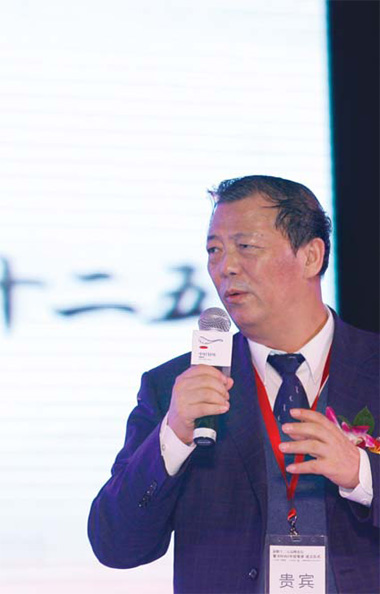Think tank notes transformation, challenges ahead
Updated: 2011-04-19 08:56
(China Daily)
|
|||||||||||
|
Yao Jingyuan, chief economist of the National Bureau of Statistics, speaks at the founding of the BMW-CBJ forum in February. Photos Provided to China Daily |
Editor's note: This year, China begins implementing the 12th Five-Year Plan (2011-15) that maps out profound economic and social transformation. Understanding the changes to come is vital for every company operating in the world's biggest market. BMW invited some of the country's top scholars to offer their perspectives on the big picture.
Old yet not rich
A major challenge in the coming five years is an aging population, which will substantially affect labor supplies and corporate costs in China, said Cai Fang, director of the Institute of Population and Labor Economics at the Chinese Academy of Social Sciences (CASS).
As the number of retirees outgrows new workers, labor supplies will fall short of demand during China's continued urbanization and industrialization in the coming years, according to Cai.
"In the meantime, we will see a quick rise in salaries in many industries," he said. "This is not just a structural phenomenon but a trend."
The proportion of people aged above 65 in the overall population in China increased from 6.8 percent in 2000 to 8.3 percent last year, compared to the world's average of 7.5 percent, according to a study by Cai's team of academics.
"China's 'demographic dividend' is waning. Its traditional advantage in labor cost is going,while the high-tech sector is not competitive enough," Cai said.
"The key task now is to find ways to fill the vacuum."
Pressing issue: CPI
For Yao Jingyuan, chief economist at the National Bureau of Statistics, one of his big concerns is the rising Consumer Price Index (CPI), a main inflationary gauge.
"The pressure of rising prices is pretty big this year, so it's very important to keep the CPI stable," said Yao.
China's CPI rose 5.4 percent in March from a year ago, higher than the 4.9 percent rise in January and February and above the government's full-year growth target of 4 percent.
Yao noted three key challenges in steering China's economy this year - maintaining stable and relatively fast growth, further restructuring the economy and properly managing expectations on inflation.
"The main issue is not the rate of growth but its quality," said Yao.
"If the economy grows too fast or even gets overheated, it's unfavorable for economic restructuring and creates a sticky job in controlling prices."
So where is the powerhouse for quality growth in the future?
The answer will probably come from industries that have solid research and development strength and can reshape China's global competitiveness, according to Jin Bei, director of the Institute of Industrial Economics at CASS.
"Traditional industries with heavy reliance on fossil fuels have run into a bottleneck, while those highly relying on China's once-cheap resources also cannot be sustained given the changing economic climate," said Jin.
He said that industries tackling the shortage of resources - such as new energy and new materials - have impetus for the future.
Some traditional industries also have opportunities if they can offset rising costs and higher environmental standards and remain competitive by increasing their technological capacity.
"Some Chinese high-end equipment manufacturers have set an example," said Jin.
Global perspective
Li Yang, vice-president of CASS, said China should "play a big role" as the global economy waxes and wanes.
"A major technological revolution is going on worldwide that will fundamentally change the way of production and reshape the world's economic map," said Li, who is also a member of the central bank's monetary policy committee.
Another trend is the old international order and its principles are being adjusted or reviewed in line with new interests, according to Li.
"China should make efforts to win more favorable conditions amid such a changing environment."
The story is provided by BMW-CBJ Think-tank, co-organized by BMW Brilliance Automotive Ltd, China Business Journal and the Chinese Academy of Social Sciences to gather China's top economists and share their thinking to facilitate Chinese companies' and local governments' pursuit of sustained growth.
(China Daily 04/19/2011 page3)
- Substandard mooncakes found
- Oil spills trigger environmental concerns
- China probes into steel tubes from EU, Japan
- PBOC may launch RMB QFII trials soon
- China to further facilitate investment
- Apple closer to offering 3G iPad 2 in mainland
- Call for stronger trade ties
- Provinces to face winter power shortages














